

Alan Turing. Alan Turing à l'âge de 16 ans.
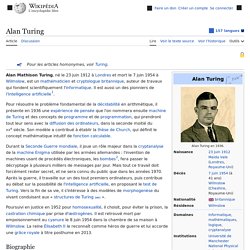
Signature Alan Mathison Turing, né le 23 juin 1912 à Londres et mort le 7 juin 1954 à Wilmslow, est un mathématicien et cryptologue britannique, auteur de travaux qui fondent scientifiquement l'informatique. Pour résoudre le problème fondamental de la décidabilité en arithmétiques, il présente en 1936 une expérience de pensée que l'on nommera ensuite machine de Turing et des concepts de programme et de programmation, qui prendront tout leur sens avec la diffusion des ordinateurs, dans la seconde moitié du XXe siècle. Son modèle a contribué à établir la thèse de Church, qui définit le concept mathématique intuitif de fonction calculable. Poursuivi en justice en 1952 pour homosexualité, il choisit, pour éviter la prison, la castration chimique par prise d'œstrogènes.
Biographie[modifier | modifier le code] Enfance et jeunesse[modifier | modifier le code] Ses parents l'inscrivent à l'école St. Déterminisme (calculabilité) Un article de Wikipédia, l'encyclopédie libre.
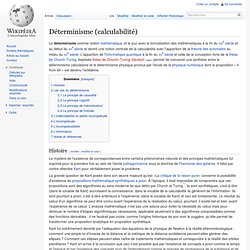
Le mystère de l'existence de correspondances entre certains phénomènes naturels et des principes mathématiques fut exprimé pour la première fois au sein de l'école pythagoricienne sous la doctrine de l'harmonie des sphères. Il fallut par contre attendre Kant pour véritablement poser le problème.
La grande question de Kant posée dans son œuvre majeure qu'est «La critique de la raison pure» concerne la possibilité d'existence de propositions mathématique synthétiques a priori. À l'époque, il était impossible de comprendre que ces propositions sont des algorithmes au sens moderne tel que défini par Church et Turing[1], ils sont synthétiques, c'est-à-dire (dans le vocable de Kant) accroissent la connaissance, dans le vocable de la calculabilité ils génèrent de l'information.
Ils sont pourtant a priori, c’est-à-dire antérieurs à l'expérience (dans le vocable de Kant) et ceci est fondamental. Dans le cas des ordinateurs à mémoire finie de taille. James McClelland (psychologist) James Lloyd "Jay" McClelland (born December 1, 1948 in Cambridge, Massachusetts) is the Lucie Stern Professor at Stanford University, where he is currently the chair of the Psychology Department.[1] He is best known for his work on statistical learning and Parallel Distributed Processing, applying connectionist models (or neural networks) to explain cognitive phenomena such as spoken word recognition and visual word recognition.
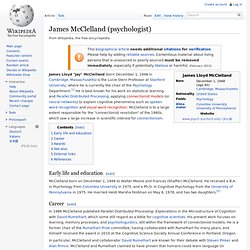
McClelland is to a large extent responsible for the "connectionist revolution" of the 1980s, which saw a large increase in scientific interest for connectionism. McClelland born on December 1, 1948 to Walter Moore and Frances (Shaffer) McClelland. David Rumelhart. David Everett Rumelhart (June 12, 1942 – March 13, 2011)[1] was an American psychologist who made many contributions to the formal analysis of human cognition, working primarily within the frameworks of mathematical psychology, symbolic artificial intelligence, and parallel distributed processing.
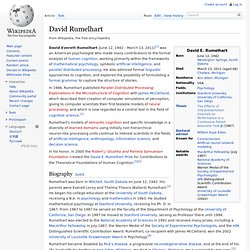
He also admired formal linguistic approaches to cognition, and explored the possibility of formulating a formal grammar to capture the structure of stories. Rumelhart's models of semantic cognition and specific knowledge in a diversity of learned domains using initially non-hierarchical neuron-like processing units continue to interest scientists in the fields of artificial intelligence, anthropology, information science, and decision science. In his honor, in 2000 the Robert J. Glushko and Pamela Samuelson Foundation created the David E. Rumelhart Prize for Contributions to the Theoretical Foundations of Human Cognition.[1][2] Biography[edit] References[edit] External links[edit] Herbert Alexander Simon. Un article de Wikipédia, l'encyclopédie libre.
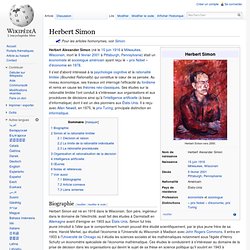
Pour les articles homonymes, voir Simon. Herbert Simon Herbert Simon vers 2000. Herbert Alexander Simon (né le à Milwaukee, Wisconsin, mort le à Pittsburgh, Pennsylvanie) était un économiste et sociologue américain ayant reçu le « prix Nobel » d'économie en 1978. Il s'est d'abord intéressé à la psychologie cognitive et la rationalité limitée (Bounded Rationality) qui constitue le cœur de sa pensée. Biographie[modifier | modifier le code] De 1939 à 1942, Simon fut directeur d'un groupe de recherche à l'université de Californie à Berkeley, puis il enseigna la science politique à l'Illinois Institute of Technology. À partir de 1949, il intègre la Graduate School of Industrial Administration au Carnegie Institute of Technology de Pittsburgh. Simon fit également partie, à la fin des années soixante du comité des experts économique du Président.
Simon et la rationalité limitée[modifier | modifier le code] Décision et raison[modifier | modifier le code]